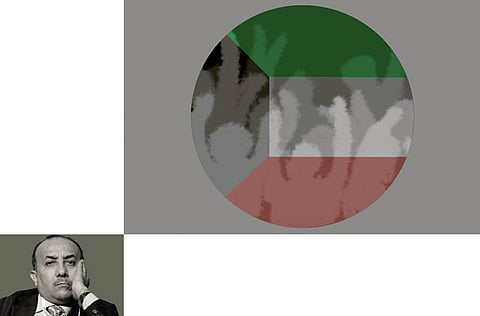Kuwait in midst of its own Arab Spring
The political upheavals in the nation are not aimed at a mere regime overthrow but a genuine constitutional monarchy

The first anniversary of the most poignant and profound changes sweeping many Arab countries and emboldening its people is approaching. The people are raising the bar and making demands of their autocratic rulers. Many of these were either toppled, killed or teetering on the brink of oblivion. Kuwait at first glance seems to fit that trend of change and reforms.
An embattled prime minister, a senior member of the ruling Al Sabah family, which garners much legitimacy and popular support, has finally succumbed to the popular pressure, led by the determined opposition and strengthened by the youth movement. Shaikh Nasser Al Mohammad Al Sabah stepped down after six years, having led seven cabinets. But this endless bickering between the cabinet and a determined parliament has derailed Kuwait's ambitious plans for development and becoming a major regional financial and services hub, as the current Emir, Shaikh Sabah Al Ahmad Al Sabah, has envisioned and espoused. The endless bickering and continuous conflicts, which keep coming like waves, have taken their toll on the psyche of Kuwaitis. They have started to question the feasibility of their pioneering model of representative politics. This in turn dissuaded GCC intellectuals and people who looked for decades at Kuwait as the beacon in the region. It discouraged investors who stayed away from the hostile environment of Kuwait and its ragged and untamed politics.
No wonder Kuwait today is the one GCC country that attracts the least amount of foreign direct investments. This Byzantine politics has besieged and brought Kuwait's political system to a screeching halt.
Yes, it is true that we are witnessing a major shift and change. Kristin Diwan, a Gulf observer, described the tug-of-war between the two branches of the political system as "Kuwait's constitutional showdown". She rightly argued that "Kuwaiti activists are not seeking regime overthrow, rather something even more rare — a genuine constitutional monarchy in the Gulf".
Kuwait has been, for decades, the harbinger and indigenous model of political participation and political representation, accountability and of checks and balances in the region, where such practices are not in vogue. Kuwait had the first written constitution in the region and is preparing next year to celebrate the golden jubilee of its constitution and its representative politics. The country's feisty and outspoken parliament is a rarity in the Arab world.
Although it is true that the forces of change were able to topple the controversial and beleaguered cabinet and force the upending of the bruised and much-despised parliament, leadership is still lacking. Divergence in issues and disagreement about priorities are the trademarks of Kuwaiti politics.
Most damaging
The Kuwaiti opposition scored a major victory and accomplished two of its three objectives: First, pushing the cabinet to resign, convincing the Emir to change the prime minister and ending the political career of Shaikh Nasser. Next, dissolving a controversial and pro-government parliament, where dirty politics had sunk to a new low.
The most damaging aspect of the outgoing parliament was the graft scandal where it was alleged that close to $350 million (Dh1.28 billion) in public funds had been deposited in personal bank accounts of 15 MPs to secure their vote on crucial issues, including one on the motion of no-confidence.
The second objective was the suspension of the parliament by an Emiri decree, following protests by the opposition and activists against corrupt practices of many parliamentarians.
The third challenge before the opposition now is to rally public support to throw out those MPs who were aligned with the government.
Kuwait seems to be in the midst of its own Arab Spring and is at the crossroads in its ongoing struggle to strengthen its democracy. The voters will chart not only the composition of the new parliament, but the future of their Kuwaiti experience, in the hope of preserving the only indigenous model for both Kuwaitis and others to emulate.
That is the real challenge for Kuwait, not Arab Spring!
Professor Abdullah Al Shayji is the Chairman of the Political Science Department, Kuwait University. You can follow him on Twitter at www.twitter.com/docshayji



